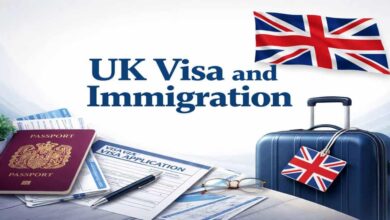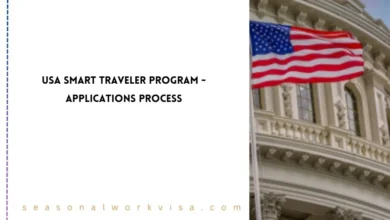Immigrate to Ireland via Critical Skills Employment Permits

Through the Critical Skills Employment Permits (CSEP) program, anyone with the right skills and abilities can move to Ireland to work in jobs where there aren’t enough qualified people. This program is designed to help people who are not from the European Economic Area (EEA) get jobs in important parts of the Irish business that need their skills.
The Critical Skills Employment Permits (CSEP) program is a great chance for highly skilled non-EEA people who want to work in Ireland. It’s meant to help the Irish economy get more skilled workers, especially in ICT, engineering, healthcare, and life sciences.
Immigrate to Ireland via Critical Skills Employment Permits:
Who Can Apply for CSEP?
People who are not from the EEA but have skills and experience in areas that the Irish government sees as important can apply for the CSEP. You’re one step closer to working in Ireland if your skills match these important ones.
Advantages of Holding a CSEP:
Securing a CSEP comes with significant benefits:
- Ease of Getting Work Permits: Unlike many other permit types, CSEP allows you to obtain a work permit without a prior job offer.
- Validity and Renewal: Initially valid for up to two years, these permits are renewable, ensuring longer stays.
- Residency Rights: Not only you but also your dependents can legally reside and work in Ireland.
- Career Growth: The program is a gateway to career advancement in Ireland’s crucial economic sectors.
How to Apply for CSEP?
In Ireland, there are several steps you need to take to make sure your application for a Critical Skills Employment Permit (CSEP) goes smoothly. Here is a complete guide on how to get a CSEP:
- Online Submission:
- To start your CSEP application, go to the website for the Irish Immigration Service, which is generally run by the Department of Justice and Equality. This is where you’ll begin the application process.
- Document Preparation:
- Gather all necessary documents required for the application. This typically includes:
- Qualification certificates relevant to the job.
- Proof of relevant work experience, typically showing at least 2 years of experience in the field.
- Employment contract or job offer from an Irish employer.
- Proof that your role falls under the Critical Skills Occupations List.
- Passport or other identification documents.
- Gather all necessary documents required for the application. This typically includes:
- Understanding Fees and Timeframes:
- Know about the fees that come with the filing process. Fees are due at the time of registration and may change depending on the person. Also, be aware of the normal working times, which for a normal application can be anywhere from 4 to 6 weeks.
- Eligibility Confirmation:
- Make sure you meet all the requirements for the CSEP. This means having the right credentials, working in a related job, and getting a job offer from an Irish company for a job on the Critical Skills Occupations List.
- Filling the Application:
- On the Employment Permits Online System (EPOS), fill out the application form. As asked, give correct and complete details.
- Tracking and Awaiting Approval:
- After sending in your application, you can use the EPOS system to check on its progress. Applications are usually processed, and during this time you may get updates or calls for more information.
- Post-Approval Steps:
- Once your CSEP application is approved, you may need to take further steps:
- you for an entry visa if you don’t already live in Ireland.
- When you get to Ireland, you’ll need to sign up with the Irish Naturalization and Immigration Service (INIS).
- If INIS or your boss gives you any other requirements or directions, you must follow them.
- Once your CSEP application is approved, you may need to take further steps:
Where to Find Information?
Irish Immigration Service (INIS):
- There is a lot of information about immigration and work permits in Ireland on the website of the Irish Naturalization and Immigration Service (INIS). You can find full instructions, application forms, and news about CSEP applications on their website.
- Website: Irish Naturalisation and Immigration Service
Department of Enterprise, Trade and Employment:
- In Ireland, the Department of Enterprise, Trade and Employment (DETE) is in charge of the rules and policies that apply to work permits. The Critical Skills Occupations List, which lists the jobs that are qualified for the CSEP, is updated on a regular basis.
- Visit the department’s website or sign up for their updates to stay up to date on the latest list of qualified jobs.
- Website: Department of Enterprise, Trade and Employment
Read Also: Ireland General Employment Permit Work VISA
Primary Source:
- Department of Enterprise, Trade and Employment:
- The most up-to-date list of Critical Skills Occupations can be found on the website of the Department of Enterprise, Trade and Employment (DETE). The jobs on this list are ones where there aren’t enough skilled workers in Ireland.
- Department of Enterprise, Trade and Employment
Supplementary Resources:
- Citizens Information:
- Citizens Information gives a lot of detailed information about living, working, and going to school in Ireland. They often give summaries and new information about work permits and skill gaps.
- Citizens Information
- Irish Immigration Service (INIS):
- The Irish Immigration Service (INIS), which is part of the Department of Justice and Equality, has a lot of information about work permits and immigration. They give information about how to apply for Critical Skills Employment Permits and changes to immigration rules.
- Irish Immigration Service
Financial and Language Considerations:
- Application Fee: There is a €1,000 fee, and if your application is turned down, you will get 90% of your money back.
- Language Proficiency: There aren’t any strict IELTS requirements, but based on your background, you might need to show that you can speak and write English well.
Path to Irish Citizenship:
You might want to apply for Irish citizenship after your time with CSEP is over. To be eligible, you must have lived in Ireland for eight years in the last ten years, be of good character, speak the language well, and show that you have become part of Irish society.
To get a job in Ireland through the CSEP program, you need to carefully plan your steps and follow the rules. Every step is important, from making sure you’re eligible to apply to become a part of Irish society. Always think about getting personalized help from immigration experts.
Conclusion:
The Critical Skills Employment Permits (CSEP) program in Ireland lets skilled professionals from outside the European Economic Area (EEA) work in Ireland and move up in the country’s business. You can get a satisfying job in your field and enjoy the benefits of living and working in Ireland if you carefully follow the application process and use the resources available from INIS and the Department of Enterprise, Trade, and Employment.
Frequently Asked Questions:
Who qualifies for a Critical Skills Employment Permit?
Highly skilled professionals in occupations such as ICT, engineering, healthcare, and finance can qualify if they have a job offer in one of these sectors with a salary meeting the minimum threshold.
Is there a family immigration option?
Yes, the Critical Skills Employment Permit allows you to bring your spouse and dependent children to Ireland, and they can live, work, and study there.
How long is the permit valid?
The Critical Skills Employment Permit is initially valid for 2 years and can be extended. After 2 years, you can apply for permanent residency.




